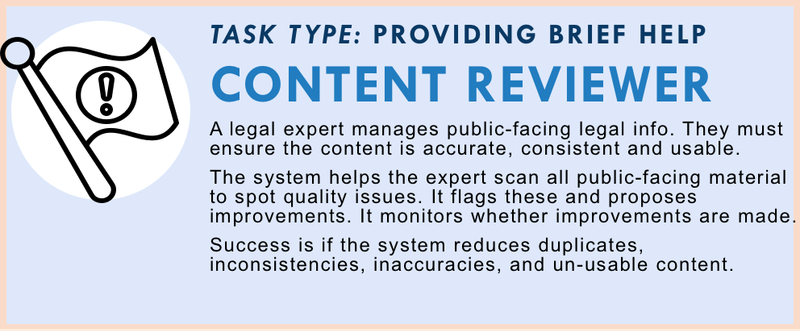Content Reviewer

Help legal experts keep public-facing content accurate, consistent, and easy to use—by scanning for issues and recommending smart improvements.
Task Description
Legal help websites and platforms contain hundreds (or thousands) of public-facing pages: guides, FAQs, forms, eligibility tools, chat scripts, and more. Over time, it becomes difficult to ensure that all this content remains accurate, internally consistent, and user-friendly—especially when laws change or staff turnover occurs.
This task involves a system that acts as a content auditor and optimization partner. It scans all public-facing legal information—across multiple formats and sections—and flags issues like outdated statutes, broken logic, conflicting instructions, duplicative pages, or confusing language. It doesn’t just point out problems—it also proposes clear, expert-aligned revisions or consolidation suggestions.
The system can evaluate content at both the micro (specific pages) and macro (sitewide structure) levels. It checks for things like inconsistent terminology, mismatched style or tone, and conflicting eligibility criteria. It also monitors whether flagged issues have been resolved, and provides the legal expert with status reports and improvement trends.
This tool is especially valuable for organizations maintaining large content libraries, multi-lingual versions, or content that spans several jurisdictions. It helps legal experts focus on high-impact edits rather than spending hours trying to spot problems by hand.
Success means that public-facing content becomes cleaner, more accurate, and more consistent—while requiring less time and effort from the legal expert to get there.
How to Measure Quality?
✅ Accuracy of Legal Information
- Flags outdated laws, expired deadlines, or changed procedures
- Identifies areas where legal context is missing or ambiguous
- Suggests correct citations or jurisdiction-specific details
🔁 Consistency Across Pages
- Detects duplicative or overlapping guides that should be merged
- Flags pages that contradict each other on core facts or advice
- Ensures terminology and style are consistent across the site
✍️ Usability and Clarity
- Identifies legalese, long or confusing sentences, and passive voice
- Suggests plain language rewrites and clearer formatting
- Scores readability and flags high-burden sections for revision
🔎 Structural and Navigational Quality
- Checks internal link structure and page hierarchy
- Flags orphaned content or pages not linked from key flows
- Suggests improvements to titles, headings, and metadata
📋 Change Monitoring and Impact Tracking
- Tracks whether flagged issues were resolved, by whom, and when
- Provides improvement dashboards or periodic reports
- Allows staff to dismiss or explain why flagged issues were left unchanged
🧠 Expert Review Support
- Explains why it flagged each issue and shows proposed improvements
- Allows quick accept/edit of AI-proposed changes
- Lets experts set custom style rules, glossaries, or red-flag topics